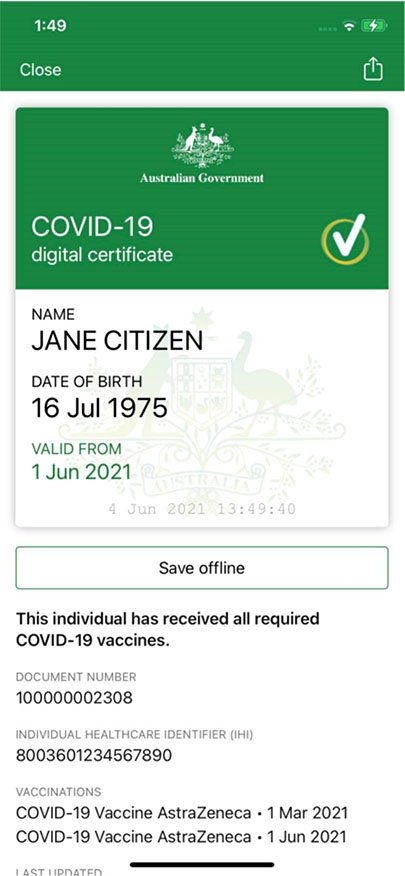Vaccine Passports are coming
In 2021 we learned a new phrase: “vaccine passport”.
A vaccine passport does not confirm its carrier’s citizenship or identity, though it may affect their ability to travel internationally, to work or even enter certain domestic and entertainment venues.
The purpose of a vaccine passport is to allow governments and private businesses to confirm the degree to which a person may be at risk of contracting COVID-19 or spreading it to others around them.
In its most basic form, a vaccine passport is (usually) a digital record that confirms whether its bearer has received two, one or no doses of a COVID-19 vaccine.

Most countries now provide a vaccination certificate. Australia’s certificate is managed by Medicare, and is available in an online app for smartphones.
The EU Digital COVID Certificate (EUDCC) contains information about its bearers’ recent test results and recovery status from COVID-19.
The EUDCC was implemented on 1 July 2021, allowing carriers – who are either fully vaccinated, have contracted and recovered from COVID-19, or have tested negative for the virus within the past day – to use a digital or printed QR code to travel freely among the EU’s 27 member states.
Some of these members have instated their own digital certificates for use within their borders, such as France’s health passport that regulates entry to clubs and (soon) bars, cafes and restaurants.
Key factors affecting the widespread implementation of vaccine passports:
- Lack of availability to younger, less vulnerable adults as vaccinations for the more at-risk have been prioritised. The creation of a system that tacitly restricts freedoms based on age raises the possibility of discrimination.
- More young people are concerned about the long-term impact of the jab, and more women than men have concerns about fertility and the vaccine, and so are less likely to take the vaccine. Likewise, those from Black or Minority Ethnic backgrounds are less statistically less keen on the jab, and so the issue of discrimination is being actively debated.
- The security risk represented by the data upon which the passports are based. Any kind of medical data is already valuable due to its personal nature, and its sensitivity only increases when it is relied upon for travel and access to local facilities.
Issues to consider
What happens if a software bug or an outside attacker disrupts the function of the digital vaccine passport?
How does the digital passport ensure authenticity in the first place? Why should we trust it?
Even if we can trust the official Australian vaccination certificate, will we be as comfortable trusting the certificates issued by foreign governments?
There will need to be significant coordination and collaboration between international entities to ensure that the data recorded by the certificate is correct and complete, and the act of safely transferring data to a local app would provide further avenues for errors and interception.
Once in the app, the data needs to be verifiably secure and stored in a tamper-evident form that itself can’t be modified.
Then there are questions regarding how the information relating to vaccine passports will be handled by the private sector.
Can you trust every employee of every business with which you transact to be scrupulous about maintaining the integrity, security and privacy of your data?
For example, if shown to nightclub personnel, do they store the information and if so how, for how long and who can access that information?
The question of how long a government organisation might retain the data is also unclear.
Whatever the case, the implementation of a passport requirement for travel and domestic activity will require intense scrutiny to ensure that the sensitive information at its base is not mishandled.
Remember in the 2010s, when personal data belonging to millions of Facebook users was collected without their consent by British consulting firm Cambridge Analytica, which on-sold the data predominantly to be used for advertising?
How confident are you that such a thing could not happen again?
What if insurance companies gained access to your vaccination data, and declined to insure you or your family because they deemed you to be too high a risk?
What if you were vaccinated, but your pregnant wife or daughter was not, and the insure still used the data to decline your application for insurance?
Third and annual doses are coming
Pfizer CEO Albert Bourla has publicly stated that people will “likely” need a third dose of a Covid-19 vaccine within 12 months of getting fully vaccinated.
He also said it’s possible people will need to get vaccinated against the coronavirus annually.
Given the speed with which the virus mutates, and how the delta variant has changed the game for everybody, it seems foreseeable that we will all need annual booster shots for COVID-19, just like we do for the flu – and for the same reasons: these viruses are constantly mutating, and the vaccinations we received last year were aimed at last year’s variants. It is like an escalating arms-race.
As new strains emerge, different vaccinations are required to keep pace.
Mandatory employment vaccinations
Qantas has made COVID-19 vaccinations mandatory for all of its workers.
Potential employment-related issues with the passport system largely intersect with concerns about discrimination based on vaccination status.
While most offices have adopted a vaccine-positive mentality, and “no jab no job” policies have been instituted in many areas, a small percentage of the workforce who have voiced opposition to being compelled to be vaccinated will likely oppose the requirement of a passport to verify their medical history as a prerequisite for work.
If these employees also belong to a protected group, disciplinary action against them may result in a discrimination claim.
The same issue may arise if it is perceived that employees are treated differently based on their vaccination status.
However in cases where employees are expected to work with those most vulnerable to COVID, the situation may be different.
For example anyone working in a registered care home for residents requiring nursing or personal care will be required by law to have received two doses of a COVID-19 vaccine unless they are subject to a medical exemption.
In due course other professions are likely to receive this same treatment, such as childcare workers, nurses, doctors, dentists etc
A company like Qantas that mandates a vaccine passport would therefore do well to ensure that its need is genuine and takes care in its treatment of employees is not discriminatory.
It is foreseeable that the widespread rollout of vaccine passports will place strain on affected industries.
The travel, hospitality and leisure sectors, already hampered by a year and a half of slackened demand and heightened regulation, will be further pressed by the responsibility to validate these passports and handle situations with customers who feel they ought to be exempt.
The added pressure may be too much for struggling businesses to handle. Employers will need to allocate resources to checking passes, and train staff on what to look out for and how to handle difficult cases.
This all comes at a time when many industries are already strained and suffering additional resource issues due to the pandemic, with staff being forced to isolate or having to stay at home to look after family members.
It is also unknown for how long the vaccine passport system will last – likely until the WHO declares the pandemic finished, whenever that may be. Don’t hold your breath.
You may also be interested in our article: https://www.genders.com.au/co-vid-vax-vex/
Genders and Partners is the oldest law firm in South Australia, established 1848.
Contact us to learn how to protect yourself, your family and your assets through modern integrated estate planning solutions, by visiting our website today and schedule a free no obligation telephone consultation to find out how we can help you and yours.
Remember – any mistakes you make in your estate planning documents won’t become apparent until after it’s too late for you to fix them. Get proper advice, and do it right.
It is also vitally important that you keep your estate plan up to date – it is not a set-and-forget exercise.
To learn how to protect yourself, your family and your assets, by creating a professionally-made estate plan, claim your FREE 15 minute Telephone Consultation
SPECIAL REPORT “7 Things You Must Know Before You Make Your Will”
In this report you will Learn:
Why home-made Wills can be a LOT more expensive than you might think.
The secret weapons used by the rich & powerful to protect their assets, and transfer their wealth two or three generations ahead.
How Estate and Trustee Companies make BIG money from “free” Wills.
The Most Common Estate Planning Mistakes, how they can cost your family a fortune, and How to Avoid Them.
The Elements of a Sound Estate Plan – why a Will alone is not enough.
How to Make Sure Your Assets Stay in Your Family and are not lost to creditors, lawsuits or ex-spouses.
How to guard against challenges to your Estate after you’re gone.
